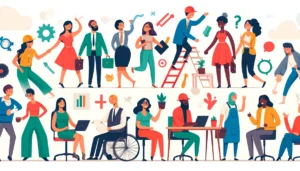Why EDIB is the crux of business longevity
- 4 Min Read
Organisations which fail to prioritise EDIB are at risk of jeopardising their long-term survival. The real change happens when EDIB becomes an integral part of the organisation’s strategy
- Author: Adina Avram
- Date published: Mar 8, 2024
- Categories

Equity, Diversity, Inclusion and Belonging (EDIB) is my passion. And, I know of many people who feel the same as I do. But, it’s surprising how many businesses overlook the benefits of introducing purposeful and extensive EDIB strategies.
The latest Employer Survey by the Department for Work and Pensions in the UK, found that one in five employees perceive ‘no benefits’ to having a diverse workforce. And, just under half (45%) of UK employers don’t even monitor the diversity of their workforce.
This shocks me. Why? The benefits to EDIB are countless. Research shows that when employees feel a sense of belonging and inclusion in their workplaces, there is a 56% increase in job performance, a 75% decrease in sick days, and a 50% reduction in turnover risk. Not to mention that diverse companies are statistically more likely to outperform competitors and make better business decisions.
For industries facing labour issues, such as manufacturing, construction, and hospitality, EDIB strategies have an important role to play in changing the trajectory of employment, and ensuring the longevity of these sectors.
Combatting backlash
At the end of 2023, the president of the largest human resources organization in the US spoke out on EDIB expressing his concern that EDIB ‘would come under full-out attack in 2024’, potentially causing companies to retreat. The comments follow increasing backlash in 2023, notably, the Bud Light boycott in the US and Elon Musk posting on X that DEI must Die in late December.
Yet, this type of visceral reaction to EDIB only goes to show that people’s beliefs are being challenged, and further proves the importance of educating society on the importance of EDIB, to people, our communities, and our economy. EDIB isn’t just an ‘add-on’, it’s an imperative part of the world, your community, and your job. And, it is imperative to business success and longevity. Looking away in the face of backlash will only threaten the longevity of a business further down the line.
Priortising longevity
Here at Trivium, we create metal packaging solutions in over 50 production facilities, with a presence in 20 countries, which means many of our colleagues work on-site in factories rather than in office-based roles. We, therefore, know firsthand the labour issues facing manufacturing.
Our average colleague is 46 years old. While an older workforce generally means you will have highly skilled and knowledgeable colleagues, it also poses a risk when people begin to reach retirement age. Without a diverse workforce, retiring colleagues will lose the opportunity to pass on knowledge and skills to the new generation.
Manufacturing has long been a male-dominated industry. Recent data shows that only 26% of the workforce is female, and 13% of the workforce is from ethnic minority groups. Many recruitment issues stem from outdated perceptions of the industry. What once required heavy labour, now relies on the latest technological innovations.
At Trivium, EDIB is a crucial part of our recruitment strategy, and we know it is a non-negotiable for many candidates. In fact, a Monster survey found that 83% of Gen Z candidates consider a company’s commitment to Equity, Diversity, Inclusion, and Belonging (EDIB) an important factor when choosing an employer. While Gallup research shows that new generations expect transparent and clear EDIB strategies from their employers.
Putting EDIB at the heart of your business
All the research indicates that organisations which fail to prioritise EDIB are at risk of jeopardising their long-term survival. Acknowledging this is one step. But, the real change happens when EDIB becomes an integral part of the organisation’s strategy and is embedded in its culture and operating model, with clear metrics to track progress and success.
To set the standard and make clear the expectations of employees, your C-Suite must be fully committed and drive forward change. Ultimately, EDIB will not only benefit your business long into the future, but also the lives of your employees, their friends, families, and communities.







